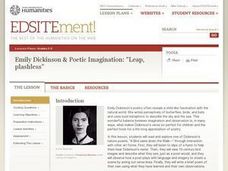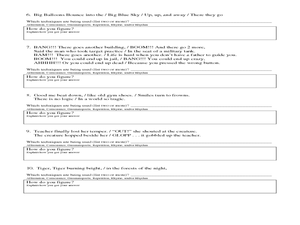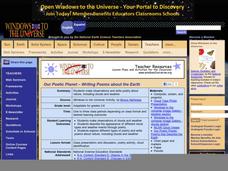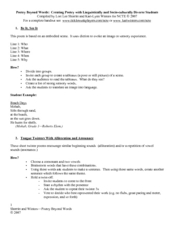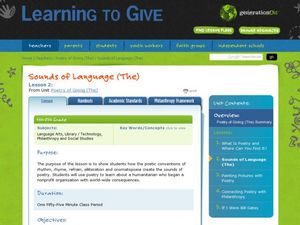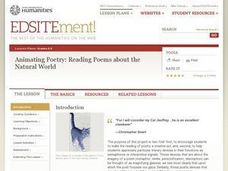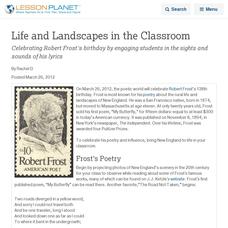Poetry4kids
Rhythm in Poetry: More Than Two Feet
Want to put some feet in your head? Check out an online lesson about spondees, dactyls, and anapests to bring new structure to your poetic forms.
Curated OER
The Poetics of Hip Hop
Students consider the role of rhythm, form, diction, and sound in poetry. For this integrated arts lesson, students discuss the attributes of poetry as they analyze Shakespearean sonnets, hip hop music lyrics, and poems by Nikki...
PBS
Using Video to Create Setting and Mood
Writers have long used words, the sound of words, and the images created by their words to describe the setting and establish the mood of their stories. To gain a more in depth understanding of how settings can be used to develop a...
Curated OER
Emily Dickinson & Poetic Imagination: "Leap, plashless"
Students analyze the poems of Emily Dickinson and write their own nature poem. In this poetry analysis lesson, students read Dickinson poetry and analyze the use of imagery, sound, and metaphor. Students write their own nature poem using...
Curated OER
Identifying Sounds of Poetry
In this poetry worksheet, students read different poetry and identify the type of poetry that is being used based on the sound. Students complete 10 short answer questions.
Curated OER
Creating Poetic Devices
In this creating poetic devices activity, 9th graders create 5 original examples of poetic techniques by listing and defining each term, then illustrating that example; a list of terms and an example are shown; a grading rubric is...
Curated OER
"Leap, plashless": Emily Dickinson & Poetic Imagination
Students examine different poems from Emily Dickinson. They practice listening for meter in the poems and make connections between the texts. They also practice their own creative writing skills.
Curated OER
Animal Noises
The Spanish song, Vengan a Ver Mi Granja, provides young language learners an opportunity to expand their vocabulary. After listening to the sounds, class members name the animals and their habitats, construct puppets of the animals, and...
Curated OER
Our Poetic Planet - Writing Poems about the Earth
As a way to combine language arts and science, try this lesson plan on writing cloud poetry. Begin by showing a PowerPoint presentation and images of cloud types. Take meteorology masters outdoors to explore the sky using the provided...
Curated OER
Reading, Writing, Reciting Exciting Poetry!
Students complete a poetry analysis unit. In this poetry analysis lesson, students study poetry by reading, reciting, and analyzing poems and their poets. Students study poetic devices, write their own poems, and complete hands-on...
Curated OER
Poetry Beyond Words: Creating Poetry with Linguistically Diverse Students
Models of and directions for how to write 20 different types of poems are featured in an NCTE resource. The introduction to each form highlights the embedded concepts. For example, tongue twisters encourage poets to use alliteration and...
Manchester University
Alliteration
Kids create cool clauses selecting a single starting sound. Ah, alliteration.
Welcome to Ms Bosello's Class!
Alliteration Worksheet
Alliteration and imagery are two vital parts of any well-written poem. Encourage your young poets to include these devices with a set of activities designed to get them thinking, writing, and creating.
Curated OER
The Poetry of Giving
Learn about philanthropy and poetic conventions with an inclusive lesson about Bill Gates. After learning about Mr. Gates' humanitarian efforts in the world, sixth graders use alliteration, onomatopoeia, rhyme, rhythm, and refrain in...
Curated OER
Reading Poems Aloud: Sound And Meaning
Students consider the elements involved in reading poetry aloud. They discuss different poetic forms and how the choices a reader makes in tone, emphasis, breaths, and pauses can affect the listener's interpretation and understanding of...
Curated OER
1900 America: Historical Voices, Poetic Visions
Learners examine the United States at the turn of the century. Using primary source documents, they interpret them within a specific historical context. Using this information, they write a poem with metaphors and a specific meter They...
Loudoun County Public Schools
Figurative Language Packet
A definitive resource for your figurative language unit includes several worksheets and activities to reinforce writing skills. It addresses poetic elements such as simile and metaphor, personification, hyperbole, and idioms, and...
National Endowment for the Humanities
The Impact of a Poem's Line Breaks: Enjambment and Gwendolyn Brooks' "We Real Cool"
Students analyze the Gwendolyn Brooks use of enjambment in her poem "We Real Cool." In this poetry analysis activity, students define common poetic devices and the examples of enjambment in the poem. Students discuss the poem and write...
National Endowment for the Humanities
Animating Poetry: Reading Poems about the Natural World
Students complete poetry analysis activities. In this poetry analysis instructional activity, students consider the use of imagery and sound devices in poetry. Students translate poetry into another art, read a diverse selection of...
Scholastic
Selecting Favorite Poems From Historical Poets
Here is a poetry instructional activity that begins with a free-association activity focused on the word voice. Learners each sit alone for a moment and make sounds that express how they are currently feeling, and then turn to their...
Indiana University
World Literature: "One Evening in the Rainy Season" Shi Zhecun
Did you know that modern Chinese literature “grew from the psychoanalytical theory of Sigmund Freud”? Designed for a world literature class, seniors are introduced to “One Evening in the Rainy Season,” Shi Zhecun’s stream of...
Curated OER
Life and Landscapes in the Classroom
Celebrating Robert Frost's birthday by engaging students in the sights and sounds of his lyrics
Curated OER
Impersonating Great Poets Using "Science Verse" by Jon Scieszka
A great way to bring poetry and parody into your language arts classroom, this instructional activity mimics famous poems based on Jon Scieszka's Science Verse. The activity not only allows the class to see examples of poem parodies, but...
Macmillan Education
Understanding Poetry (Elementary)
Introduce young readers to poetry analysis with a instructional activity that uses Emily Bronte's "Spellbound" to model how poets use word choice, the sounds of words, the repetition of words, and rhyming patterns to create the mood,...





